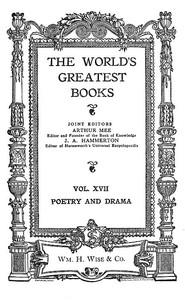The World's Greatest Books — Volume 17 — Poetry and Drama by Mee and Hammerton
"The World's Greatest Books — Volume 17 — Poetry and Drama," edited by Arthur Mee and J.A. Hammerton, is a collection of significant poetic and dramatic works. This volume likely spans various time periods, reflecting the evolution of poetry and drama through diverse literary styles and themes. The likely topic covers essential plays and poems from renowned authors, focusing on their contributions to poetry and drama, including notable figures like Goethe, Heine,
and Goldsmith. The opening of this volume sets the stage for an eclectic assortment of dramatic works and poetry, starting with Goethe's "Goetz von Berlichingen," which unfolds a tale of an adventurous knight. The drama portrays Goetz navigating challenges and personal ambitions against a backdrop of political intrigue and conflict. It introduces readers to characters such as Goetz himself, his faithful companion George, and the aristocratic Weislingen, evoking themes of loyalty and freedom. The text illustrates Goethe’s character-driven storytelling, marking a significant representation of German literature's vivid landscape. (This is an automatically generated summary.)
Read or download for free
| How to read | Url | Size | |||
|---|---|---|---|---|---|
| Read now! | https://www.gutenberg.org/ebooks/44640.html.images | 906 kB | |||
| EPUB3 (E-readers incl. Send-to-Kindle) | https://www.gutenberg.org/ebooks/44640.epub3.images | 528 kB | |||
| EPUB (older E-readers) | https://www.gutenberg.org/ebooks/44640.epub.images | 534 kB | |||
| EPUB (no images, older E-readers) | https://www.gutenberg.org/ebooks/44640.epub.noimages | 449 kB | |||
| Kindle | https://www.gutenberg.org/ebooks/44640.kf8.images | 869 kB | |||
| older Kindles | https://www.gutenberg.org/ebooks/44640.kindle.images | 1021 kB | |||
| Plain Text UTF-8 | https://www.gutenberg.org/ebooks/44640.txt.utf-8 | 620 kB | |||
| Download HTML (zip) | https://www.gutenberg.org/cache/epub/44640/pg44640-h.zip | 485 kB | |||
| There may be more files related to this item. | |||||
About this eBook
| Editor | Mee, Arthur, 1875-1943 |
|---|---|
| Editor | Hammerton, J. A. (John Alexander), 1871-1949 |
| Title | The World's Greatest Books — Volume 17 — Poetry and Drama |
| Contents | Goethe (Continued): Goetz von Berlichingen. Iphigenia in Tauris -- Nicolai Gogol: The inspector-general -- Oliver Goldsmith: She stoops to conquer -- Heinrich Heine: Atta Troll -- Homer: The Iliad. The Odyssey -- Horace: Poems -- Victor Hugo: Hernani. Marion de Lorme. Ruy Blas. The king amuses himself. The legend of the Alps -- Henrik Ibsen: The master builder. The pillars of society -- Ben Jonson: Every man in his humour -- Juvenal: Satires -- Friedrich Gottlieb Klopstock: The Messiah -- Gotthold Ephraim Lessing: Nathan the Wise -- Longfellow: Evangeline. Hiawatha -- Lucretius: On the nature of things -- James Macpherson: Ossian -- Christopher Marlowe: Dr. Faustus -- Martial: Epigrams, epitaphs, and poems -- Philip Massinger: A new way to pay old debts -- Milton: Paradise lost. Paradise regained. Samson Agonistes -- Molière: The doctor in spite of himself. |
| Credits |
Produced by Kevin Handy, Matthias Grammel and the Online Distributed Proofreading Team at www.pgdp.net |
| Reading Level | Reading ease score: 82.7 (6th grade). Easy to read. |
| Language | English |
| LoC Class | PN: Language and Literatures: Literature: General, Criticism, Collections |
| Subject | Poetry |
| Subject | Drama |
| Category | Text |
| EBook-No. | 44640 |
| Release Date | Jan 10, 2014 |
| Most Recently Updated | Oct 23, 2024 |
| Copyright Status | Public domain in the USA. |
| Downloads | 746 downloads in the last 30 days. |
| Project Gutenberg eBooks are always free! | |

